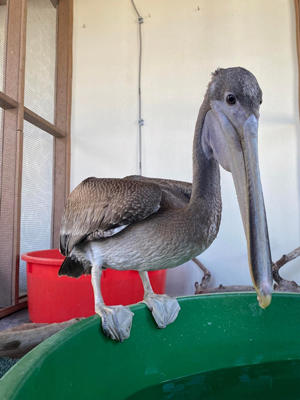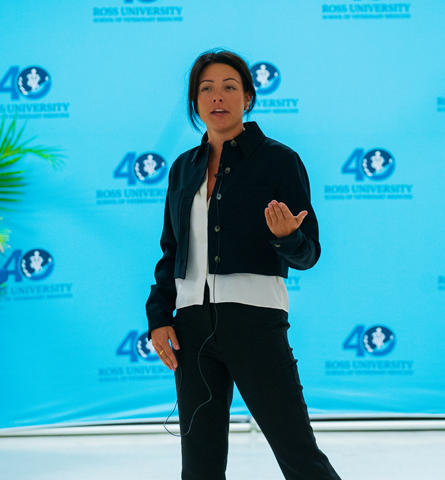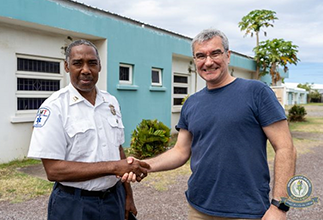On November 18, 2022, the Ross University School of Veterinary Medicine (Ross Vet) community was host to an exciting event for the Federation of St. Kitts and Nevis, which witnessed the release of a rehabilitated and banded Brown Pelican (Pelecanus occidentalis occidentalis), the Federation’s national bird.
The bird, which came to be affectionately known as “Peli Brown” by its caregivers, was brought to Ross Vet’s campus for treatment on August 2 after a group of students discovered it unable to fly and being chased by local dogs near Half Moon Bay, an off campus living complex. “Upon examination it was determined that the bird was a juvenile and that it was emaciated and dehydrated with a number of abnormalities evident through blood work,” said Kimberly Stewart, DVM ’06, MS, PhD, associate professor of exotic and avian medicine and founder of the St. Kitts Sea Turtle Monitoring Network (SKSTMN).
Dr. Stewart was joined by Andre Escobar, MV, MSc, PhD, Diplomate BCVA, assistant professor of anesthesiology, to lead what was ultimately a team of 50 volunteers to help the bird with basic life skills necessary for survival in the wild, flight training to build strength and endurance, and training to capture and consume live fish prey. Drs. Stewart and Escobar called on student volunteers from several organizations, including the Avian Club, which Dr. Escobar serves as faculty advisor, the Zoo, Exotics, and Wildlife (ZEW) Club, and SKSTMN. Over 300 volunteer hours were spent with Peli Brown throughout the three-month rehabilitation on campus.
“Field and rehabilitation settings are one of my favorite settings for student interaction,” said Dr. Stewart. “Wildlife cases require quite a bit of thinking outside of the box to accommodate appropriately because we are not in a controlled environment with predictable behaviors, schedules, and outcomes. You really get to see the creative and endurance side of the staff you are working with. It requires significant investment of time and strength (both physical and emotional) and takes a unique personality to endure and persevere.”
WILDLIFE REHABILITATION TACTICS
Students who were caring for Peli Brown had a wide variety of responsibilities. Drs. Stewart and Escobar trained the students with specific wildlife rehabilitation tactics to meet Peli Brown’s juvenile needs. Students learned about proper restraint techniques for a pelican, appropriate medical treatments, and administration of medications for a pelican’s anatomy, and assisted with Peli Brown’s daily feeding, flight training, and even tasks as simple as collecting salt water for its enclosure. As the rehabilitation progressed throughout the semester, some students assisted in Peli Brown’s diagnostics and radiographs with Gilda Rawlins-Vaughan, DVM ’02, diagnostic imaging instructor and lead for imaging at Ross Vet’s small animal clinic.
“The volunteers we had were great, and their level of engagement and dedication were inspiring,” said Dr. Stewart. “I enjoyed our daily interactions and watching them engage in new experiences while developing skills with a species they do not usually have exposure to. Collaboration is key to success with these species, and the willingness and effort put in by all parties was truly rewarding. I gained a lot from this experience and hope we can use the information gained through this case to facilitate further research and treatment of this species.”
Peli Brown gained 1.1 kilograms, double his body weight, since it was found in August and became adept at flight and capture of live prey. Many of the volunteers were present on November 18 to witness its release back into the wild, which you can watch here in a video posted by Dr. Stewart on YouTube.
Prior to being released, a blue leg band was placed on Peli Brown’s right leg with the identifying number G19, which enables the volunteer team to continue monitoring its progress in the wild and gain valuable information on movement. The band was donated by Scott Rush, PhD, MS, BS, an associate professor at Mississippi State University’s Forest and Wildlife Research Center.
Today, the Brown Pelican is St. Kitts and Nevis’ national bird and a species protected by the North Carolina Environmental Policy Act (NCEPA), which covers wildlife in the Caribbean region, since 2009. It was listed as an endangered species in 1970 but had its population recovered because of newly enacted environmental policies. “This species is a symbol of the success of wildlife and ecosystem conservation,” said Dr. Stewart. “On behalf of Ross Vet, we are grateful to have played a small role in the continuation of this process through the rehabilitation of Peli Brown.”
Sightings of Peli Brown in the wild can be reported to the St. Kitts Sea Turtle Hotline at (869) 764-6664.







